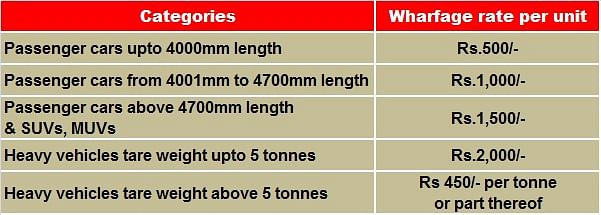Mumbai Port reduces port charges for coastal ro-ro service
Ro-Ro shipment of vehicles will help reduce congestion on roads, be a cheaper and environmentally friendly option and also facilitate faster movement of vehicles meant for distribution and export.
In an attempt to encourage the coastal movement of cargo, especially automobiles, by Ro-Ro (Roll-on-Roll-off) ships and to meet the demand of vehicle manufacturers and Ro-Ro vessel operators, Mumbai Port Trust has reduced vessel-related charges by about 10% on the applicable scale of rates for coastal vessels with further reduction of wharfage charges on vehicles. The reduced charges are as under:

This reduction in wharfage and vessel-related charges, which is to the tune of about 50-65%, will be applicable for a period of one year from June 1, 2016. The reduction in wharfage is aimed at encouraging movement of domestic cars and trucks from automobile manufacturing plants in locations such as Chennai and others to Mumbai, and similarly from the auto hubs of Pune and Nashik to the southern and eastern parts of India. At present, production-ready vehicles are transported by road.
Mumbai Port Trust’s move is in line with the Ministry of Shipping’s plan to promote water transportation and make it competitive to roads and railways transportation.
The waterways mode of transportation is fuel-efficient, environment- friendly, and capable of easing traffic congestion on roads and railways thus preventing loss of human lives due to accidents. The government is looking to promote coastal shipping and inland waterways transportation and has envisioned the increasing of the share of waterways transportation mode from the present level of 7% to 10% by 2020.
To provide thrust to the transportation of automobile cargo through waterways, apart from relaxing cabotage for Ro-Ro vessels, the wharfage charges on per unit basis, instead of on ad valorem basis, have been introduced for major ports and tariff is prescribed at concessional rates for RoRo vessels on coastal voyage for transporting cars from one Indian port to another Indian port.
The reduction in wharfage is aimed at encouraging movement of domestic cars and trucks from automobile manufacturing plants in locations such as Chennai and others to Mumbai, and similarly from the auto hubs of Pune and Nashik to the southern and eastern parts of India. At present, production-ready vehicles are transported by road.
Recommended reading:
RELATED ARTICLES
Rajiv Bajaj reappointed MD and CEO of Bajaj Auto for five-year term
Bajaj Auto’s Board of Directors has approved the re-appointment of Rajiv Bajaj as the company’s MD and CEO for another f...
JSW MG Motor launches Comet EV Blackstorm edition
The key highlights of the Comet EV Blackstorm, which is now the top-end variant, are its ‘Starry Black’ exterior along w...
Maruti Suzuki begins production at new Kharkhoda plant
Phase 1 of the Kharkhoda plant will have an annual production capacity of 250,000 units and produce the Brezza compact S...






 By Autocar Professional Bureau
By Autocar Professional Bureau
 20 Jun 2016
20 Jun 2016
 12309 Views
12309 Views








 Ajit Dalvi
Ajit Dalvi

